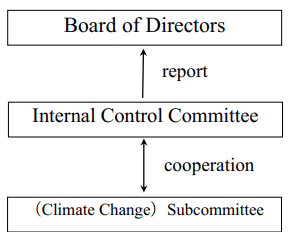We have identified addressing climate change as one of our key management issues and will clarify the impact on our business operations and our response to it, as well as actively promote the disclosure of information in the four areas of “Governance,” “Risk Management,” “Strategy,” and “Indicators and Targets” based on the TCFD’s recommendations.
The basic policy, matters that need to be addressed, etc. regarding climate change are considered and deliberated by the Internal Control Committee, which is chaired by the Representative Director and President. The Internal Control Committee holds a meeting every month, and in addition to the situation concerning internal control, it analyzes and evaluates all kinds of risks and opportunities related to climate change, discusses short, medium, and long-term measures and arranges the system for strengthening them.
Under the Internal Control Committee, we have set up a subcommittee, which is responsible for the detection, evaluation, etc. of risks and opportunities concerning climate change. The subcommittee concerned with climate change also considers and reports relevant matters alongside the Internal Control Committee held every month. Furthermore, our Board of Directors supervises, discusses and gives advice on whether the allocation of management resources and the structure of the business portfolio are effective in regard to climate change, and the promotion thereof, in order to formulate a long-term vision in accordance with the Corporate Ideology.

Regarding the risk management system for natural disasters, etc., our company is prepared for setting up a Risk Management Emergency Headquarters headed by the Representative Director and President in case of an emergency. The Risk Management Emergency Headquarters is composed of a communication team made up of internal departments and an external advisor team including a legal counsel, if necessary, and will swiftly respond to prevent the expansion of damage and arrange a system for keeping damage at minimum.
Our corporate group has recognized risks and opportunities concerning climate change that have an impact on the business of our corporate group, and has performed a scenario analysis. Aiming for sustainable business activities even amid different weather and economic situation, we have considered the perspectives of two scenarios: the scenario below 1.5 ℃ (in which the global average temperature rise stays below 1.5 °C in comparison with pre-industrial levels) and the 4 °C scenario (in which the global average temperature rises 4 °C or more in comparison with pre-industrial levels).
As a result, we found out that in the scenario below 1.5 °C, the business of our corporate group would be significantly impacted by the trends in political measures, laws and regulations as well as changes in the preferences of our clients, etc., while in the 4 °C scenario, there would be a considerable impact caused by damage to our operational bases, the supply chain, etc. brought about by intense disasters. As the impact of climate change on business will change depending on global steps toward decarbonization, changes in the preferences of users, etc., we shall keep taking such social trends into account and reflect them on the business strategy of our corporate group.
We believe that in order for enterprises to continue their activities, it is vital to promote business which will contribute to the sustainability of people, the society and the earth in addition to respecting human rights. We recognize that the response to issues pertaining to sustainability, such as social and environmental issues, is an important factor in elevating the corporate value in the medium/long term, and while stipulating items concerning sustainability in the Charter of Corporate Behavior, which is the foundation for all kinds of corporate activities, we have established and published a “Basic Sustainability Policy” based on the regulations in the Charter of Corporate Behavior. Moreover, we continuously address issues pertaining to sustainability and ESG in accordance with said policy and disclose their contents on our company website as well as the English website. Our company shall endeavor to maintain good and harmonious relationships with stakeholders such as our clients, staff, shareholders, investors, trade partners, the government and local societies, and proactively engage in building a sustainable society based on the Charter of Corporate Behavior.
Total greenhouse gas emissions for the fiscal years ending March 31, 2022 and 2023 are as follows. We will continue to work toward setting targets that contribute to the reduction of greenhouse gas emissions from a medium- to long-term perspective.
| Fiscal year ended March 31,2022 | Fiscal year ended March 31,2023 | |
| Scope1:Direct emissions(t-CO2) | 3,037.0 | 3,154.6 |
| Scope2:Indirect emissions(t-CO2) | 2,999.7 | 4,238.7 |
| Scope1+Scope2 Subtotal(t-CO2) | 6,036.8 | 7,393.2 |
| Scope3*:Other than Scope 1 and 2(t-CO2) | 80,584.6 | 163,845.6 |
(Note) Our company has five new consolidated subsidiaries as of the fiscal year ended March 31, 2023, and total greenhouse gas emissions for the fiscal year ended March 31, 2023 include the greenhouse gas emissions of the five companies.